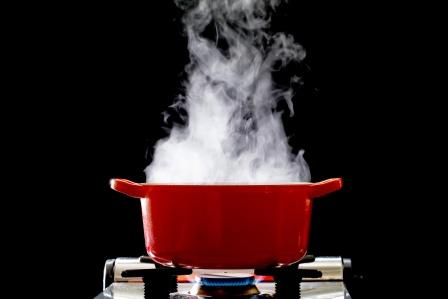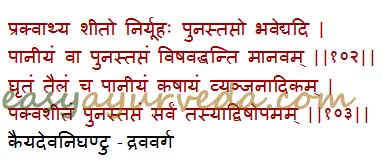Ayurveda’s Take On ReBoiling Water And Herbal Teas

Reboiling water, in the context of this article means, boiling ones, allowing to cool down and then again boiling it. Somehow, Ayurveda does not like this thing.

The above Sanskrit verse means the following –
Once any liquid, water or kashayam (decoction) is boiled and cooled down, if it is re-heated, that liquid acts like Visha – poison.
Besides water, this rule also applies to –
Ghrita – herbal ghees
Taila – herbal oils
Paneeya – herbal drinks and juices involving boiling process
While making Leha – herbal jams like chyawanprash, we make the Kashaya (decoction / herbal tea) first and then to it, other jaggery or sugar etc are added and re-heated.
In this case, the Kashaya is not allowed to cool down and as soon as Kashaya is ready, we just add the other ingredients and continue heating. So, there, the above rule does not apply.


About making oils, Avaleha:
There is another rule (above Shloka)
While preparing
Ghrita – herbal ghees,
Taila – herbal oils
Guda – jaggery based herbal jams (and Avaleha in general),
It is best to prepare it in more than one day. This is because, the night time has its own beneficial effect on the product.
But here, it cannot be considered as re-boiling. Because, once Kashaya is made, it is added with sugar / oil / ghee. Then boiled for some time, and then by next day, the boiling is continued. Here, the boiling is a continuous process and we are not re-boiling the finished product.
For using oils for massage
Some practitioners heat the massage oil, just before starting massaging. This is, kind of okay, in winters and in cold climate places. Because, if we massage extremely cold oil, it may cause Kapha increase, leading to excess stiffness or Vata Dosha increase. So, heating the oil, just above the room temperature, before massage is agreeable.
Can we heat the market available kashayam, before consumption?
No. There is a wrong assumption to heat the ready-made kashayam that is available in the market, before consumption. This is double dangerous. Here, not only the Kwath, even the preservatives also get heated, leading to complex unhealthy mix. It may cause worse diseases than the patient already is suffering with.
Logic –
Why Re-boiling water makes it poison?
The answers are not totally convincing. Here is some effort:
The water contains dissolved gases and minerals. Once they are boiled, they reach an activated stage. But if they are cooled and re-boiled, their complex interaction makes it poisonous or unhealthy to consume. In Ayurveda, it leads to formation of Ama – a product of altered digestion and metabolism.
One article says – “you risk concentrating certain undesirable chemicals that may be in your water. Examples of chemicals that become more concentrated include nitrates, arsenic and fluoride” (source)
Another one says –
Nitrates turn into nitrosamines and become carcinogenic. These chemicals have been linked to diseases like leukemia and non-Hodgkin lymphoma as well as various types of cancer.
Meanwhile arsenic accumulates which can result in cancer, heart disease, infertility and neurological problems.
Minerals that are good for us in small doses, such as calcium salts, can be very harmful when re-boiled and can lead to kidney stones and gallstones.
Worryingly, an increase in the level of fluoride can have damaging effects on the cognitive and neurological development of children.
What is wrong with reboiling Kashayam, herbal ghee, oils etc?
Kashay / kwath / decoction simply means boiling herbs with water for some time, filtered.
Like all cooked foods, Kashay is told to be taken when it is freshly made and in hot condition. Kashay making itself is a form of cooking. Only in high Pitta condition, a freshly made kwath is allowed to cool down before consumption.
So, when kashay is freshly made, the water soluble active prinicples of herbs are in activated, charged condition. This, when consumed, gets easily absorbed and quickly show their benefits in the body.
But if Kashayam is re-heated, after cooling down, it looses the charge of active principles and they become very hard for digestion, leading to production of ama – a product of altered digestion and metabolism. This further leads to onset of many diseases.
Same is the case with lehyams, herbal ghees and herbal oils.
This rule also applies to cooked food.
Heating is a process of charging up the active principles in the food and herbs that we consume.
Once they are charged up and activated, they have to consumed so that their energy and total of their phyto-nutrients are easily absorbed by the body.
But once after they cool down and again re-heated, they are not as charged as previously, leading to erratic absorption.
This has been my understanding of this concept thus far. If you have further reasoning to add, please write about them in the comment section below.









28 comments on “Ayurveda’s Take On ReBoiling Water And Herbal Teas”
Paramkusha Naidu Siddineni, Section Officer, Finance Department, AP Secretariat.
Sir,
We boil milk in the morning, when it come to home. We usually prepare tea, coffee later by boiling the same milk. Does it effect on our health.
If so, milk supplied in packets by dairy is also once boiled and cooled. it also effects on or health.
Please, clarify.
Dr J V Hebbar MD(Ayu)
Dear sir, re-boiling of water and wherever water is used as medium, as in Kashayam, Avaleha etc are contra indicated.
But because oil and ghee are also contra indicated, it hints that milk re-boiling is also not a good thing.
We cannot do anything about pasteurization of milk.
But when boiling milk, it is best to boil only half a liter and use it fully, and then boil another pack of half a liter. This way, cooling down of milk, before its usage in making tea coffee etc is avoided.
Misior
Hello Doctor,
What about warming up the meal or for example compote? Is it also harmful if it is only wormed up to some point, not reaching 100 degress celcius?
All the best and thank you for this very informative website.
Dr J V Hebbar MD(Ayu)
Warming meals slightly is fine. But cooking it in the morning, then refrigerating, then warming it at night would definitely compromise the quality of food and not so good. Freshly made meals, in hot condition, is the right thing. Hope we all get enough time to do that everyday 🙂
Ravi
I suspect this rule applies to milk as well .People all across boil milk and then put it in the fridge and again heat it multiple times during the day. Though what you have shared makes a hell of a lot of sense but what I am more concerned about is the use of the word “poison” in the ayurvedic texts. These days the so called educated illiterates are almost re-heating just about everything let alone liquids. Pakodas(fritters), Besan boondis, Barfi khoya , almost everything is being heated over and over again and the people are doing fairly fine when seen in the context of the word “poison”.What do you say ?
Dr J V Hebbar MD(Ayu)
Poisons are of two types – quick and slow. 🙂
Ravi
How does the Ayurveda define POISON ? Write an article as and when you feel like.
As for your answer I got your point. Thank you.
Dr J V Hebbar MD(Ayu)
Will try to write on this topic.
Read here about Charaka’s views – https://www.easyayurveda.com/2015/12/02/charaka-visha-chikitsa-23rd-chapter/
chintu2005
I normally boil my drinking water in the morning. During the day, as this water becomes cold, I heat new water and mix with the previously boiled water to make it warm. Is there any harm in mixing the new boiled water with previously boiled but now cold water in this manner?
Dr J V Hebbar MD(Ayu)
Hi, as per the above theory, mixing the newly boiled water with previously boiled water is not a good idea.
Boil the water, sufficient enough for you to empty in 12 hours.
chintu2005
Are there any good books or literature on Paka shastra that you can recommend.
chris
If in the ancient vedic period there were two meals only per day, how exactly were Brimhana therapy or Vajikarana therapy excuted?
Vajikarana meal at noon and evening?
Dr J V Hebbar MD(Ayu)
Hi, If Vajikarana meal quantity was that of a total meal, then the regular meal was replaced with Vajikarana meal.
Rahul Singhal
Kindly review this quick 1 min recipe to prepare Giloy Juice to prevent Chikungunya and Dengue
https://www.youtube.com/watch?v=fV15E7PvQ8A
Dr J V Hebbar MD(Ayu)
Useful to reduce fever.
C V MANIAN
Your argument looks far fetched. What you say for concentration of salts in the water is fine, for water containing lot of dissolved salts. This is true of ground water in many parts of north India. But in places like Mumbai, where the water quality is fairly good and on chlorination, only the dissolved gases are boiled off. Thus even after repeated boiling nothing should happen. Similarly in India, there is no need to boil the pasteurized milk. We waste lot of energy as a country, by repeatedly boiling the milk and there is no need for it. The pasteurized milk is good enough to be taken as such in small quantities.
Kshitiz Mishra
A doctor told me that even if the milk is pasteurized, some bacteria may develop as it may be kept in room temperature (or more than that in summers). So it is best to boil.
Lutz Mossbauer
Regarding Re-Heating Food: Besides the comment in the article we have to take into consideration that also any cooked food is conquered by bacterias very quickly. The metabolic products might be quite poisonous and mostly cannot be destroyed by re-cooking. Though – i have to admit – sometimes the food tastes even better when re-cooked (e.g. Hungarian goulash).
Dr J V Hebbar MD(Ayu)
Nice points! Thanks.
Prakruthi
Greetings of the hour. In our households, ghee is often heated ( not boiled) just before serving, or served on piping hot dish. Does this also turn into poison ? Also I have noticed it is traditionally served in silver pots, what’s the significance of this practice, please let me know. Thank you.
Dr J V Hebbar MD(Ayu)
Hi, just heating does not affect the quality of the ghee, negatively. Hence, it is fine.
As per Ayurveda, quality of storing vessel has its own effect on the food stored.
Example: It is told that Ghee kept in bronze vessel for more than 10 days should not be taken. (Ashtanga Hrudaya, Sutrasthana 7th chapter)
Gold, silver vessels etc are considered as ideal to store food. This is why kings used to take meals in silver vessels.
Read more about silver benefits – http://ayurmedinfo.com/2012/07/05/rajat-bhasma-benefits-dosage-ingredients-side-effects-preparation/
Prakruthi
That’s very informative. Thank you.
atmarama
sir, should we not fry anything in ghee as this would constitute reheating the ghee? this seems strange because frying spices in ghee is a common practice.
Dr J V Hebbar MD(Ayu)
Hi, heating and even boiling ghee is allowed in Ayurveda.
Even in preparing herbal ghees such as Triphala ghritha, ghee is boiled with other herbs.
So, heating, frying with ghee is allowed.
Re-heating / re-boiling of the herbal ghee, after its preparation is not indicated.
Maah
Hi Dr. Hebbar. i have always heard to not reheat rice as it become poisonous. Then i read you could reheat by keeping it in a pot and placing into boiling water. Not the fire but warm water would be touching the pot of rice. Eating refrigerated food cannot be good. Might this be a way to safely reheat things? As an aside…imagine what a microwave does to cooked food. ????
Dr J V Hebbar MD(Ayu)
I have not recommended re-heating rice anywhere. If it so, that should be a mistake.
In the comments I talked about re-heating ghee.
Grant
Greetings Sir, I appreciate your diligent efforts to bring this information to light
I get my water from a local Spring dispenser.
However, I asked them if they boil the water before dispensing it. I received this message:
“Our dispenser dont boil the water. It will heat it up to around 90 degrees [Celsius] thats all”
Do you think that this could pose a problem? Such as if I boil it before drinking, or even just having the water for days-weeks after it has already been bought to a temperature of 90 degrees Celsius?
Thank you!
Dr J V Hebbar MD(Ayu)
100% of microbes die in water at 100 degree celsius boiling. However, above 60%, most of the bacteria die. So, I do not see any problem.